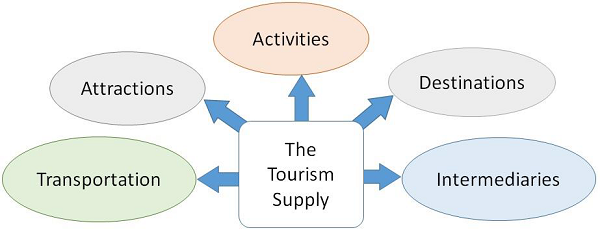1. Attractions : General all inclusive term travel industry marketers use torefer to products that have visitor appeal like museums, historic sites, performing arts institutions, preservation districts, theme parks, entertainment and national sites.
2. Culture : The sum total of knowledge, attitudes, beliefs and customs towhich people are exposed in their social conditioning.
3. Tourism : Tourism where the residents of a country takeholidays as business trips wholly within their own country.
4. Destination : The country, region or local area in which the touristspends his or her holiday.
5. Excursionists : People who take leisure trips which last one day or lessand do not require an overnight stay away from home.
6. International tourism : Those tourist trips where residents of onecountry take holidays or business trips to other countries.
7. Intabgibility : The characteristic of a service by which it has no physcialform and cannot be seen or touched.
8. Leisure : Leisure is considered to be free time in other words, the timewhich is not devoted to work or other duties. However, some people also usethe term to describe an industry which provides products and services for peopleto use in their spare time.
9. Motivation : Those factors which make tourists want to purchase aparticular product or service.
10. Package : A fixed price salable travel product that make it easy for atraveller to buy and enjoy a destination or several destinations. Packages offer a mix of elements like transportation, accommodation, restaurants, entertainment,cultural activities, sight seeing and car rental.
11. Seasonality : The distribution over time of total demand for a product or destination, usually expressed in terms of peak off-peak seasons to distinguish between those times when demand is higher than average and vice versa.
12. Tourism : The practice of touring or travelling for pleasure or recreation and the guidance or management of tourist as a business.
13. Tour operator : An organisation which assembles ‘package holidays’from components provided by other sectors such as accommodation andtransport. These packages are then sold to tourists usually through travel agents.
14. Tourist : A temporary visitor staying at least 24 hours in the countryvisited and the purpose of whose journey can be classified under one of thefollowing heading (i) leasure (ii) business, family mission, meeting.
15. Travel Agent : An individual who arranges travel for individuals orgroups. Travel agents may be generalists or specialists. The agents receives a 10 to 15% commission from accommodations, transportations companies andattractions for coordinating the booking of the travel. They typically coordinatetravel for their customers at the same or lower cost than if the customer bookedthe travel on his / her own.
16. Tourist product : A sum total of a country’s tourist attraction,infrastructure and tourist services which hopefully result in consumer satisfaction.
17. Visitor : A widely used term for someone who makes a visit to an attraction. Visitors are not all tourists in the technical sense in that they will not allspend at least one night away from home.


